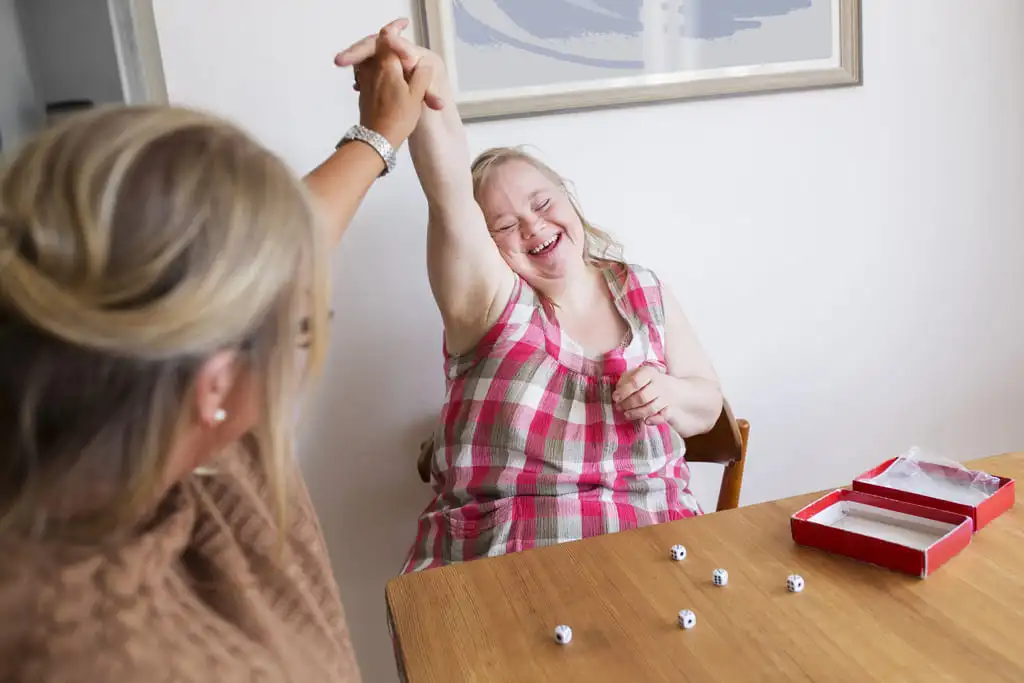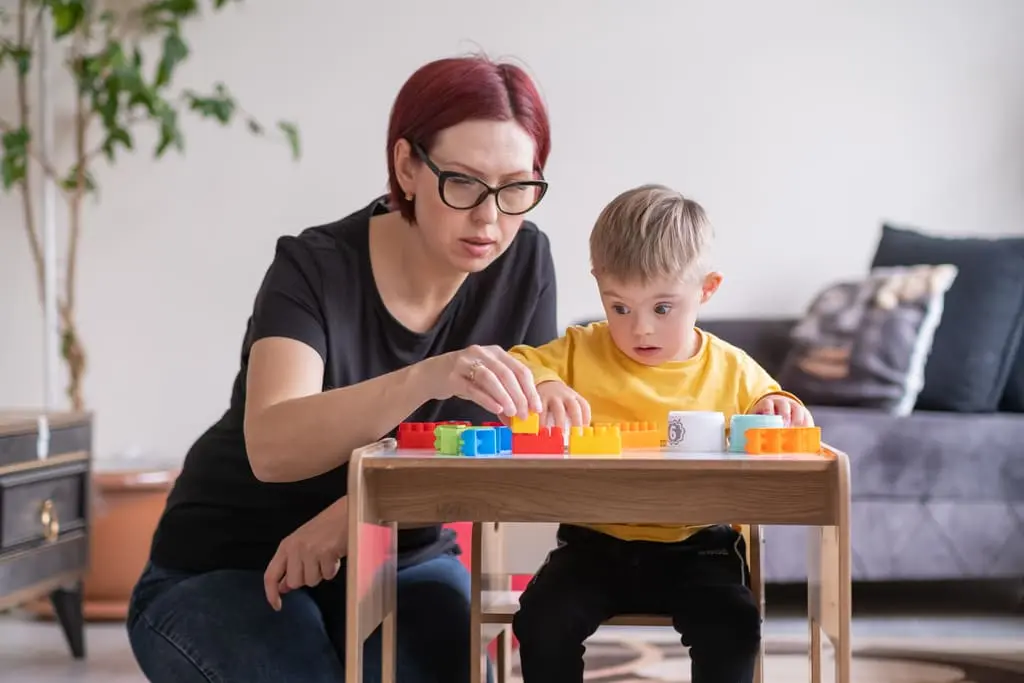What is Occupational Therapy (OT)?
Occupational therapy supports people of all ages experiencing physical, cognitive, or sensory challenges. These challenges can affect both physical and mental health, making it difficult to engage in daily activities. Occupational therapists aim to enhance people’s ability to manage everyday tasks, learn strategies, and do self-care. They help people live their best lives at home, work, and everywhere else. It’s about being able to do the things each person wants and loves to do.
Everyday activities are essential for maintaining physical and mental health, as well as emotional and spiritual well-being. The main goal of occupational therapists is to support people in addressing barriers that affect their emotional, social, and physical needs. They often involve family members and support workers in their approach to ensure it’s collaborative and everyone understands the person’s needs.
Leaf Complex Care has a comprehensive team of specialists consisting of Occupational Therapists, Positive Behavior Support Practitioners and Speech and Language Therapists. Our therapeutic services are centred on the well-being of the people we serve. Therefore, we invest in our therapy team’s specialist training, humanised practices and models of care, such as the Perma Model and Capable Environments, to meet and exceed each person’s unique needs.
To learn more about our therapy team’s expertise and what services we offer, please click here. We guarantee a response within a week.
What Can Occupational Therapy Do For You?
Occupational therapy interventions can improve people’s physical and mental health and enhance their quality of life by addressing barriers that affect emotional, social, and physical needs. This is achieved through everyday activities, exercises, and specific therapies meeting the person’s needs.
Occupational therapists collaborate with people of all age groups and can assess various aspects of daily life within their home, school, or workplace. They examine tasks that pose challenges and explore alternative methods for completing them.

Occupational therapists can recommend tools or equipment that people may find helpful, such as:
- Mobility aids like a walking frame, walking stick, or wheelchair
- Utensils with large handles and thick pens
- Customised seating options
- Electric toothbrushes
- Adaptive keyboards or mice for computer use
- Devices for turning book pages
- Non-slip mats for the bath
- Bed raiser
- Voice-activated lighting and software
- Two-handled cups, tap turners, and kettle tippers
Why Do Occupations Matter?
Occupations encompass a wide range of activities we engage with in daily life, both as individuals and as part of our communities. This can include work, hobbies, and other responsibilities. They give life meaning and build our values, interests, and aspirations. Ultimately, occupations provide people with a renewed sense of purpose and open up new opportunities to positively shape people’s future.
Focusing on meaningful activities enhances our capacity to accomplish necessary and desired tasks, improves social relationships and communication, strengthens connections, and positively impacts our mood and sleep. When the focus is on our daily occupation, it ultimately enhances our ability to enjoy what we do, helping our mental health and social relationships bloom.
What is the Role of an Occupational Therapist?
Occupational therapists are essential when we are experiencing changes in our lives. When we can no longer do a specific activity or need to change how we do it due to specific challenges, it can affect how we see ourselves and our sense of purpose. This is where occupational and physical therapy really can help.
Occupational therapists require a degree in occupational therapy, registration from HCPC (HealthCare Professionals Counsel) and membership to RCOT (Royal College of Occupational Therapy) to practice as a therapist. Governing bodies and NICE guidelines ensure proficiency standards in a therapist’s practice and support them to keep up to date and continue to develop healthcare standards.
Occupational therapy supports people in adapting to changes. Therapists work with people to find new ways to carry out activities that are meaningful to them, helping to maintain or rebuild their sense of self and purpose. Whether it’s learning new methods to perform daily tasks, finding alternative activities, or using adaptive tools, occupational therapy aims to improve overall well-being and independence.
An occupational therapist can support people with:
Assistive technology (aids and adaptations) – This can include devices such as wheelchairs, hearing aids, communication aids, prosthetic limbs, environmental control systems, and specialised computer input devices. The goal is to identify the most suitable equipment and technology to enhance daily living activities and improve overall quality of life.
Adapting Tasks – Occupational therapists assist people by creating new methods for them to carry out necessary or enjoyable activities. They can also advise on alternative approaches, techniques, or tools to empower people to accomplish their goals.
Developing skills – Occupational therapists can support people to improve motor functions or cognitive skills, enabling them to engage in essential activities such as cooking, dressing, bathing, etc. For instance, they may employ physical exercises to enhance strength or skill, cognitive exercises to address memory challenges, or specialised activities to overcome sensory or communication difficulties.
Key Principles and Approach
Rooted in a holistic approach and person-centred perspective that focuses on each person’s needs and aspirations, there are multiple principles that occupational therapists use in their work:

Maintaining Holistic Approach
Occupational therapists focus on the whole person, addressing emotional, physical, cognitive, and environmental factors that affect the person’s ability to live independently and participate fully in life.
Person-Centred Care
Occupational therapists work collaboratively with the people they support to develop personalised treatment plans. These tailored plans meet the specific aspirations and goals of each person, promoting health and social needs.
Evidence-Based Practices
Occupational therapists employ the latest research and evidence-based practices to deliver high-quality care. They consistently assess the impact of their interventions and make adjustments as needed.
Functional Independence
Occupational therapists help people increase their functional independence, encouraging daily activities with genuine dedication and proper support.
What Can Occupational Therapy Help With?
Each person has their own unique and diverse needs in life. Taking a central part in people’s lives, occupational therapy services can support:
People with developmental delays
People living with learning disabilities
People with mental health conditions
People who are recovering from post-surgery
Older adults
People with sensory challenges
People living with cognitive differences
Occupational therapy encourages people to stay independent and take part in daily activities. This can mean finding practical solutions, changing their surroundings, using new techniques, and offering different equipment. It includes giving tools and strategies to improve memory and overall abilities.
Occupational therapy can also address social and play skills in children, supporting them to gain self-confidence, problem-solving abilities, and social skills through play. It can particularly benefit children with social challenges or people living with learning disabilities.
⇒ Learn more about The Role of Occupational Therapy in Addressing Global Developmental Delay.
Community-Based Occupational Therapy
Community-based occupational therapy focuses on helping people improve their ability to perform daily activities within their own community. Here are some key points to understand:
Community-based occupational therapy occurs in everyday environments, such as homes, schools, workplaces, and community centres. Occupational therapy helps people adapt and thrive in the places where they live and work.Focus on Real-Life Settings
Personalised Support
Therapists work closely with people to understand their unique needs and goals. They create customised plans for people to maintain independence and improve their quality of life.Practical Solutions
Occupational therapists provide practical strategies and solutions tailored to the person’s challenges and strengths. This might include adapting the home environment, suggesting new ways to perform tasks, or recommending assistive devices.Community Integration
A key goal is to encourage people to fully participate in their community. This might involve supporting them in self-care, accessing community resources, participating in social activities, or finding employment.
OT with Leaf Complex Care
Leaf Complex Care’s occupational therapy services are based on humanised interventions and Positive Behaviour Support (PBS) practices, employing the social model that supports people’s daily activities in maintaining or developing their independence. Occupational therapy is a cost-effective intervention that can reduce hospital readmissions, decrease healthcare costs, and improve outcomes, making it a valuable investment for the sector.
Interventions we employ:
Social support for different activities (physical support, verbal prompting, communication tools and supporting carers and families)
Creating activity planners to build a meaningful routine
Modifying the environment to meet people’s needs
Practising gross and fine motor skills, cognitive and social skills and emotional regulation
Sensory aids and developmental delay aids
Our occupational therapists utilise a practice model that integrates scientific principles, evidence-based approaches, and person-centred care.
⇒ Learn more about How Occupational Therapy Can Help Autistic People.
Contact us today for humanised support in your own home, focusing on your daily needs to maintain independence and improve your quality of life.
We deliver our services across the UK with offices in Bristol, South East, Birmingham and Somerset.

